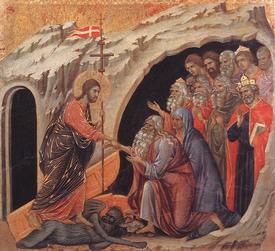Of all the parables this [one on the prodigal son,
Matthew15:11-32] is the most popular, appealing more universally to the heart
of man than any other. In fact, it contains the whole scope of the theology of
God and the salvation of men. And to some extent it applies to all of us to
some degree. Unless we have lived perfect lives, it is true we are called
prodigal.
As Catholics, if we have done wrong, we go back to our Father. Christ is represented by a priest. We say, "Father, bless me for I have sinned." The priest gives a blessing. The penitent then says, "Father, it is so long since my last confession and I have sinned as follows." He expresses his sorrow and contrition for his sins. Then the words of absolution are pronounced over him. God sees in him one that has been redeemed by the blood of Christ.
Then he is led to the glorious Lamb of God, slain for us on Calvary, residing in the tabernacle, to be our food. The tabernacle door is opened. It contains these hosts, every one of which is the body, blood, soul and divinity of the Lamb of God, giving peace to you, and there is rejoicing among the angels.
There is told the story of an old French curate when a prodigal came to him. As he was making his confession in the sacristy, the priest smiled and the young man stopped and said, "Father, if you are going to laugh at me I won't go on with my confession." "My son,' said the priest, "You misunderstand. I was only thinking of what the Lord said, 'There is more rejoicing among the angels of heaven over one sinner that repents than over ninety-nine just persons which need no repentance.'" That is the spirit of the mercy and love of God. God understands our weaknesses, our waywardness, infirmities, like sheep going astray. His love goes out, seeks us, so glad to have us come to Him. The very angels of God sing with God the Father, that we are back home again.
I hope that everybody, in the degree in which you are a prodigal, will take home the message of the love of Christ, the Sacred Heart of Jesus, and won't keep away from it. Repent of your sins, feel his embrace, that joy of conscience after a good confession, after you have been forgiven. The Father's says, "I am well pleased with you now. You were lost and you are found." [See Luke 15:32]
(Father Paul Wattson, SA, Retreat at Hereford, Texas, June 1922)


